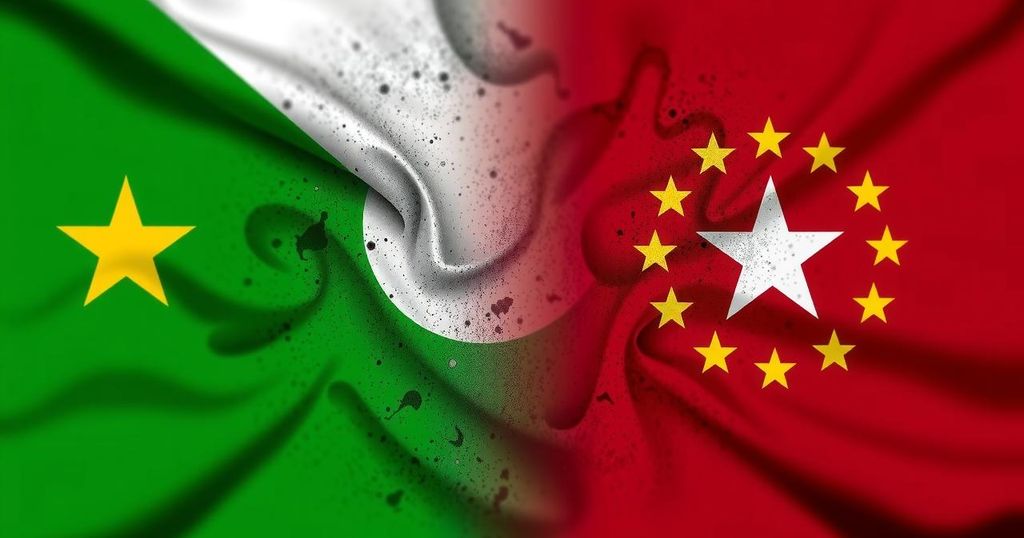The military alliance between Sudan and Eritrea, marked by discussions on security and economic coordination, risks igniting tribal conflicts in eastern Sudan. Observers warn that the alignment of various armed groups with the Sudanese Armed Forces, supported by Eritrean training, could escalate violence and deepen regional instability. The strategic partnership emphasizes the critical need for diplomacy to maintain peace and prevent a broader tribal war.
On Tuesday, Lt Gen Abdelfattah El Burhan, the leader of Sudan’s Sovereignty Council and Commander-in-chief of the Sudanese Armed Forces (SAF), concluded a significant visit to Asmara, Eritrea, where he conferred with President Isaias Afwerki. Their discussions centered on establishing security coordination, military collaboration, and enhancing economic ties, resulting in mutual agreements that affirm Eritrea’s supportive role amidst Sudan’s ongoing turmoil. President Afwerki underscored the necessity of resolving Sudan’s crisis autonomously with regional backing, emphasizing the importance of Sudan’s sovereignty and stability for regional security.
El Burhan expressed appreciation for Eritrea’s previous backing during Sudan’s conflicts, signaling an intent to fortify their bilateral relationship. Analysts contend that this visit aimed to cement Eritrea as a strategic ally for Sudan’s armed forces while addressing the sensitive dynamics involving armed groups operating in Eritrea’s western territories. Notably, Eritrea accommodates various eastern Sudanese armed factions, including the Beja Congress and the United Popular Front for Liberation and Justice, contributing to the military focus on border security in light of potential conflicts.
Economic cooperation also emerged as a vital point of discussion, particularly regarding the reopening of crucial border crossings. The Kassala-El Lafa highway, where substantial revitalization work is nearing completion, was highlighted as a crucial income-generating corridor for both nations. Afwerki’s commitment to maintaining regional stability extends to military preparedness, suggesting that he might intervene if Sudan’s unrest escalates into eastern territories, including Kassala and El Gedaref.
Simultaneously, eastern Sudan has been witnessing rising tensions among various armed groups, such as the Eastern Battalion and Beja Congress, many of which have formed alliances with the SAF and have received training in Eritrean camps. The recent shift in the Eastern Battalion’s alignment with the SAF raises alarms regarding the potential for widespread tribal violence, as historical tribal allegiances across regions may become embroiled in the conflict. The establishment of Eritrean training camps for various armed movements adds complexity to the regional militarization and heightens the risk of clashes amongst factions.
Political analysts warn that this rapid militarization, combined with the geostrategic significance of eastern Sudan — housing essential Red Sea ports and resource-rich lands — could exacerbate tribal divisions, further threatening regional stability. The burgeoning military cooperation between Sudan and Eritrea emphasizes the critical need for careful diplomatic engagement to avert a deepening spiral of conflict in the region.
The current situation in Sudan, marked by military unrest and political instability, necessitates a closer inspection of its alliances and regional interactions. Sudan’s ongoing internal conflict has prompted its leadership to seek support from neighboring countries like Eritrea, which has longstanding security concerns, particularly regarding border stability and the management of armed groups. Eritrea’s involvement is propelled by its interest in a degree of regional influence, critical economic ties, and the management of security threats emanating from Sudan. The rising tensions in eastern Sudan, home to various armed factions and historically significant tribes, pose an additional layer of complexity to the dynamics between Sudan and Eritrea, raising fears of broader tribal conflict.
In conclusion, the military alliance between Sudan and Eritrea, as evidenced by recent discussions about security cooperation and economic collaboration, carries with it significant risks, particularly the ignition of tribal conflicts in eastern Sudan. With various armed groups aligning themselves with the SAF and Eritrean support, there is a potential for a broader tribal war that could destabilize not only Sudan but also its coastal neighbor, Eritrea. Thus, a careful approach towards diplomatic engagement and regional stability is imperative for preventing further escalation and violence.
Original Source: www.dabangasudan.org






